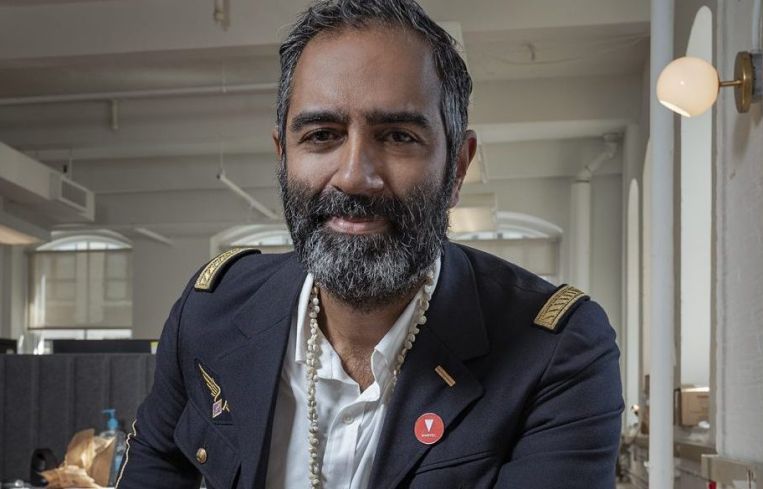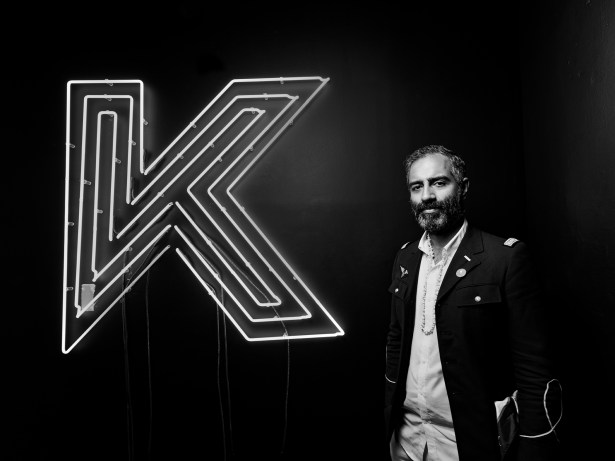Amol Sarva Is Making Knotel Bigger Than the ‘We’ Word
And while he's at it, the shared office mastermind is unveiling a new platform that could revolutionize proptech

Amol Sarva is running late.
You can’t really hold it against the guy. He’s all apologies as he glides into the Knotel headquarters at 137 Varick Street in Hudson Square, which the company will soon be vacating. (Disney is redeveloping the property.) His excuse is he was on the phone with a distant time zone discussing details for some future deal for his company, Knotel, the office space provider.
“It turns out it’s hard to travel and speak loud enough for the other guy to hear you.”
Tall, bearded, with a friendly, sunny disposition and undergraduate and graduate degrees from Columbia University and Stanford University, respectively, the 41-year-old has been busy since founding the company in 2015. (Actually, he was busy before that, too—he founded Virgin Mobile USA, a no-contract mobile provider, Peek, a mobile tech company, and several others.)
While coworking spaces have been popping up at a clip that’s almost too difficult to keep up with (just last week brokerage CBRE announced that it was getting into the game as did landlord Tishman Speyer), Knotel has stood out among the rest.
True, Knotel hasn’t gobbled up nearly as much space as WeWork, which as of this September became the largest private tenant in New York City with more than 5.3 million square feet of space, but at 1.7 million square feet, and 100 or so locations, Knotel is nothing to be trifled with. And Sarva is unbowed by Adam Neumann and Miguel McKelvey’s multibillion dollar behemoth. (Disclosure: Joseph Meyer, Commercial Observer’s publisher, is an investor in Knotel.)
“We will be bigger than them in the next 15 months,” Sarva told Commercial Observer. “We’re already a third of their size in New York—their home market. We have more locations than they do, which means we have more owner relationships than they do.”
But, then, the competition is only one thing on his mind. In addition to offices in Los Angeles, San Francisco, London and Berlin, Knotel purchased 42Floors, the commercial real estate search engine, with the idea of putting it to use for its new blockchain idea. But we’ll let him tell you about it.
Commercial Observer: Coworking is having its moment and a lot of people are jumping into it. How do you guys differentiate yourselves?
Amol Sarva: [Knotel] is just office. I think the other stuff everybody else is slinging is just confusing and distracting.
It’s true—with your competitors there are a lot of bells and whistles.
And the bells and whistles are of questionable value. I mean, it’s very clear people need office space to work together and get stuff done—it’s quite amazing how straightforward that is. The hocus pocus gets you to waste lots of money. So, the folks that are talking about the best design, the most comfortable couches—it’s ridiculous. And it shows in their returns. They spend a lot of money and they lose a lot of money.
I’m very curious about your national and international expansion. You’re in San Francisco and London. Are there any other markets that you’re looking at?
This is a vast, global enterprise in the making; there are 20 or 30 cities in the world where all the office [deals] happen. Those cities are getting bigger. America just crossed the 80 percent urbanization—the world just crossed 50 percent urbanization. Those trends are going to continue. And that means we’re going to be in those 20 or 30 places for sure.
Where did the idea for Knotel come from?

In the middle of 2015 I noticed that the office I had been running my software company [Knote] in [at 33 West 17th Street] looked to other people like coworking. And everybody wanted it [to be that]. Like, the owner of the building, Norman Kurlan, wanted to give us more floors. Companies wanted to move in. At that point I actually found it annoying. Eugene Lee, Knotel’s global head of real estate and development, said, ��You should start a coworking company” and I was like, “I don’t think I need this.” And then upon reflection I got this “pizza” idea from Edward [Shenderovich], my co-founder. Edward’s like, “You’re running this office while we run our software company in your spare time. It’s always full, it makes money and you still don’t do anything—and you complain it’s annoying to you? It seems like the easiest business in the world.” In fact, it reminded him of pizza. He was one of the early investors in a company called Delivery Hero [a food delivery service]. He said, “Hmm, there’s this thing people want: pizza. And without reinventing the pizza, you’re just providing a different channel to consume it.”
When you started, how did you go about scouring these spaces?
Like working for the post office—you go up and down the street. In the beginning it was a hustle. People just didn’t want to talk to us. I would not get meetings. We would go beg the old man who has a building on whatever Soho street and say, “Oh please, Mr. Old Man—I’m just like you, from the same town”—not really—but try to persuade him to let us in. You’ve got to meet these people to get through the beauty contest.
Tell us about some of the stuff Knotel has in the pipeline.
About a year ago we started kicking around the idea of, “What if the owner of a building would have a vacancy coming up, we could just be like—click!—and they would know that we would rent it for them?” What if we could do that? We figured there were some next generation of owners and some pockets of brokers who were clever and just waiting for this moment. Because the old way [of leasing a vacancy] is super slow and super expensive and super legalized—and it’s just annoying. There’s a lot of slow turnaround. There’s a whole industry of advisers and consultants that just feed on that flow. And fundamentally it’s just slowing down and making opaque a thing that everybody needs. So we acquired this company earlier this year, 42Floors [the office listings website], which is a very important real estate platform.
And our thought was: Let’s get to the spot where the owner can do a little vanity surfing and see their building and fill a vacancy.
The owners know somebody’s come up with a huge [amount of space they need], they already know everything about the building. They know every time it was listed in the last 10 years, we know all the floors, we know the location. We just don’t know whether you’re offering it. Once you’re ready to offer it, maybe you answer a few more questions and tell us about the innards and gizzards in there, and [people can do the lease immediately]. We rolled out something called “Express.”
It’s a straightforward [process]— landlords and brokers put their numbers in and within 24 hours they get a proposal to just sign.
[Lee told CO at last month’s interview with Sarva that Knotel completed its first Express lease at 13 West 35th Street, and it has another 50, or so, in the pipeline.]
Will it be a general application, or just buildings that you guys manage?
Well, we take all comers but there are certain areas where we’re really active. We could say no on some properties. But here in Manhattan we’re looking at everything.
How else are you going to use 42Floors?
It involves blockchain.
OK…
Are you calm?
I’m calm.
Basically, information in real estate is totally messed up—there’s nobody who really wants to tell you the truth. Everybody’s okay fudging it a little bit, pretending they checked but they didn’t check. It’s somewhere between the blind eye and really active deception.
As we started doing some deals we started just writing down, like, a spec sheet. We’ve done like 100 buildings—we might have made proposals on maybe 1,000. And we probably saw 10,000 spaces. And that’s all we know. But we actually know more than almost anybody in the market because we’re such a large tenant that only a handful of other tenants have looked at those buildings. And then we had this really nice opportunity to do 42Floors; we go under the hood and there’s a ton of information—much more than we expected. Every office that’s been available for a decade in America—10 billion square feet of office—is all wrapped, stacked, tagged, bagged, catalogued. That’s really cool. Now we have a lot of data. But we still have nothing. We still don’t have so much other information that’s around. The only way is if we got more folks to come to the table and start sharing and comparing information. Verifying it. There’s stuff in the Rudin portfolio that only Rudin knows and we’re never going to find out—unless we come up with a system of exchanging information and sharing and comparing it. And they all have incentives to do that.
How’s blockchain involved?
I didn’t really pay attention to [blockchain] at first. Now I think probably the single largest and most practical use-case for anything in the world of blockchain is this. The technologies around blockchain make a little machine for truth. It’s a truth machine. Put stuff in: The group has to verify it—is it thumbs up or thumbs down? Input key code. And so information that gets in there has to be true. That’s not true for Wikipedia. In Wikipedia there’s a whole editorial review—but [when it comes to] heavily contested matters with a lot of interests that compete? You can’t use it. So the Web didn’t come up with a good solution for publishing verified truth—but blockchain did. And the experiment in the last year in bitcoinland and some of these other currencies has demonstrated that. It’s actually pretty hard to get robbed in bitcoinland because of the security and the decentralization.
While [bitcoin’s] a cool experiment, it’s not worth anything. Real estate is worth everything. It’s $30 trillion worth of office—and if you’re burning 2 percent of that a year on [informational data and due diligence], that’s hundreds of billions. That’s really valuable information. And nobody’s made progress on it, and I think blockchain is the way to do it. We started socializing the blockchain project and we’re going to be [wheeling out partners in] this in a couple of weeks: A bunch of huge brokerages, a bunch of huge financial information companies, a bunch of the biggest tenants in the world are all going to join this consortium of information.
[Sarva later told us the venture will involve a partnership with CompStak, to create real estate’s first automated valuation model, a kind of Zestimate for the worth of an office.]
You think that people who have that proprietary information are going to be willing to make that swap?
Well, they’re going to get paid. Basically, for a lot of people, they have information that they don’t have any tangible competitive advantage from. It’s almost all their information [that’s not valuable]—it’s just 1 percent that’s valuable.
What are you calling this?
Baya—that’s the name of this beautiful bird and it makes an amazing nest and it’s a complicated builder and it collaborates… So it’s ‘Baya.'”



